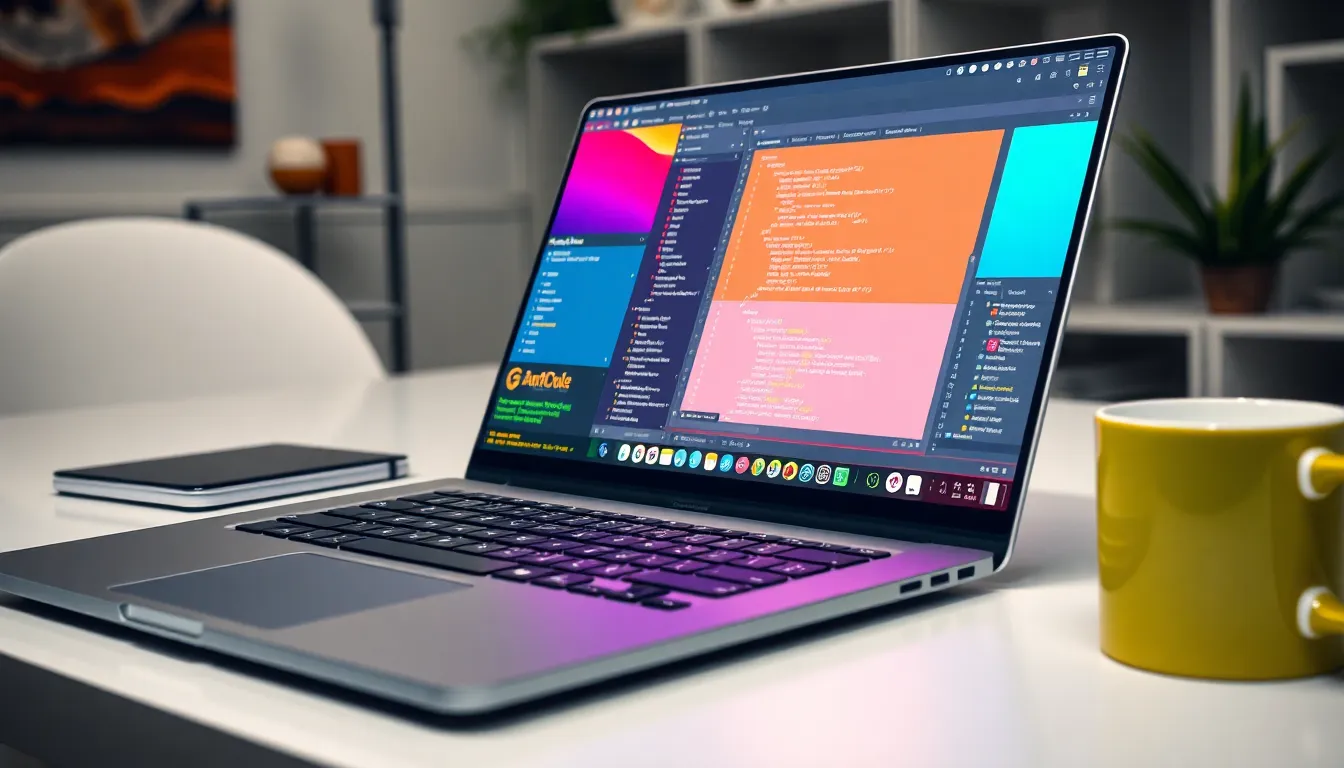In the fast-paced world of tech, Android development tools are the secret sauce that transforms brilliant ideas into stunning apps. Think of them as the Swiss Army knife for developers—equipped with everything needed to slice through coding challenges and whip up user-friendly experiences. With the right tools in hand, developers can go from zero to hero faster than you can say “debugging nightmare.”
Android Development Tools
Android development tools play a crucial role in the creation of mobile applications. These tools cater to various aspects of app development, from coding to debugging. Integrated Development Environments (IDEs) like Android Studio provide developers with a comprehensive platform for coding projects. Android Studio offers features such as code completion and real-time error checking, which simplify the coding process.
Emulators allow developers to test applications on virtual devices, simulating different screen sizes and Android versions. Testing on emulators helps ensure apps function correctly across diverse environments. Additionally, Android SDK contains essential libraries and API documentation, equipping developers with necessary resources for building applications.
Version control systems like Git facilitate collaboration among developers, allowing them to track changes and manage multiple project versions. Utilizing Git fosters teamwork and streamlines the development process. For UI design, tools such as XML layout editor enable developers to visually construct layouts, improving user interface design efficiency.
Libraries abound for specific functionalities, providing pre-built solutions for common tasks, such as image loading and database access. Incorporating libraries reduces development time and enhances code reliability. Furthermore, analytics tools offer insights into app performance and user behavior, guiding future improvements.
For those seeking additional resources, online platforms like Stack Overflow and GitHub offer community support and code repositories, fostering a collaborative environment for learning and sharing. Choosing the right combination of these tools significantly influences the success and efficiency of Android development projects.
Key Features of Popular Android Development Tools

Android development tools offer a variety of features that enhance mobile application creation. Key tools stand out for their unique capabilities.
Android Studio
Android Studio serves as the official IDE for Android development. It includes powerful code editing features like code highlighting and suggestions that streamline the coding process. Real-time error checking helps developers identify issues as they work. The built-in emulator allows testing on various screen sizes and Android versions, ensuring compatibility. Gradle integration simplifies project automation and dependency management. Additionally, a comprehensive layout editor enhances user interface design, supporting drag-and-drop functionality.
Visual Studio Code
Visual Studio Code functions as a lightweight yet powerful code editor. Extensions for Android development enhance its capability, providing support for Java, Kotlin, and other languages. Live server features enable immediate previewing of changes, streamlining the development process. Integrated Git support simplifies version control, allowing effective collaboration among team members. Debugging tools contribute to efficient troubleshooting, while a customizable interface enables developers to tailor their workspace according to individual preferences.
IntelliJ IDEA
IntelliJ IDEA excels as a full-featured IDE for Java and Android development. Advanced code assistance improves productivity, offering smart code completion and suggestions. A built-in terminal supports command-line usage without leaving the IDE, enhancing workflow efficiency. The extensive plugin ecosystem extends functionality to suit various project needs. Developers benefit from automated refactoring tools, which simplify code maintenance. Integration with version control systems like Git promotes collaborative development and ensures smooth project management.
Comparative Analysis of Development Environments
Several critical factors influence the choice of development environments for Android applications. Performance and user experience stand out as essential components.
Performance
Performance metrics significantly vary across development environments. Android Studio delivers excellent performance due to its strong code editing capabilities and seamless integration with the Android SDK. IntelliJ IDEA also excels, offering advanced code analysis that speeds up development and debugging. Visual Studio Code, while lightweight, can slow down with extensive extensions. Each environment may present trade-offs. Developers must balance heavy features with resource consumption based on project requirements. Testing applications using built-in emulators from these platforms ensures optimal performance across devices and screen sizes.
User Experience
User experience hinges on the tools that support the development process. Android Studio provides a comprehensive layout editor, making it easier to design intuitive user interfaces. Developers appreciate its drag-and-drop functionality, which simplifies UI design. IntelliJ IDEA enhances user experience with automated refactoring, while Visual Studio Code offers simple, uncluttered interfaces tailored for Android development through extensions. Utilizing these environments enables developers to create engaging and user-friendly applications, directly impacting audience satisfaction. Prioritizing user experience ensures that developers can deliver high-quality apps that meet user expectations and market standards.
Essential Plugins and Extensions
Numerous plugins and extensions enhance the functionality of Android development tools. Gradle, a key plugin, automates the build process while managing dependencies efficiently. Code analysis tools, like SonarLint, provide real-time feedback on code quality, assisting developers in maintaining high standards.
Android Lint serves as another crucial tool, identifying potential bugs and optimization opportunities in the codebase.
For UI design, the Material Design Components library simplifies the incorporation of Google’s design principles, ensuring a modern look and feel. Jetpack Compose, an innovative toolkit, streamlines UI development with a declarative approach, offering flexibility and efficiency.
Developers often utilize Retrofit for network operations, which simplifies API requests and response handling. Testing code is essential, and Espresso provides powerful automated testing capabilities for UI interactions.
Version control systems benefit from the integration of GitLens, enhancing collaboration by offering insights into repository history and code authoring.
Debugging tools, such as Stetho, enable inspection of network requests, databases, and shared preferences directly from Chrome Developer Tools.
For project management, Jira integrations facilitate task tracking and team collaboration, integrating seamlessly with existing workflows.
Developers can enhance their workspace through Android Studio’s plugin repository, discovering extensions tailored to individual needs and preferences.
Prioritizing the right plugins and extensions allows developers to streamline their workflows and improve application quality significantly.
Best Practices in Using Android Development Tools
Utilizing Android development tools effectively enhances overall productivity. Prioritize knowledge of Integrated Development Environments (IDEs) like Android Studio, which streamline coding through features like code completion and real-time error checking. Familiarity with these features allows developers to optimize their workflow.
In testing applications, developers benefit from using emulators to simulate different screen sizes and Android versions. Emulators facilitate comprehensive testing, ensuring applications function smoothly across diverse devices. Developers should also leverage the Android SDK, which provides essential libraries and API documentation.
Collaboration thrives with version control systems such as Git. Version control systems enable teams to work together efficiently, maintain code integrity, and manage conflicts seamlessly. Important plugins like GitLens enhance this collaboration further by providing additional insights.
When designing the user interface, developers can benefit from UI design tools to simplify layout construction. Tools like the Material Design Components library align with modern design principles, making applications visually appealing and user-friendly. Streamlining development through Jetpack Compose fosters a declarative approach that reduces boilerplate code.
Maintaining code quality requires integrating code analysis tools like SonarLint and Android Lint. Regular checks help identify potential bugs or optimization opportunities early in the development process. Prioritizing these practices leads to cleaner, more maintainable code and a better user experience.
Lastly, using analytics tools offers insights into app performance. Gathering performance metrics allows developers to make informed decisions about future updates and enhancements. Emphasizing these practices strengthens Android development projects and results in higher quality applications.
Conclusion
The landscape of Android development tools continues to evolve, offering developers a robust suite of resources to streamline their workflow. By embracing tools like Android Studio, Visual Studio Code, and IntelliJ IDEA, developers can enhance their productivity and create high-quality applications that stand out in the competitive market.
Incorporating essential plugins and adhering to best practices can significantly improve the overall development process. As developers prioritize user experience and code quality, they’ll find that these tools not only simplify complex tasks but also foster collaboration and innovation. The right combination of tools can truly transform ideas into successful applications, making the journey from concept to launch smoother and more efficient.



